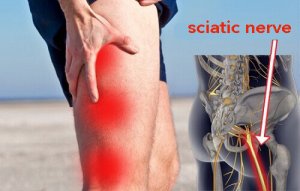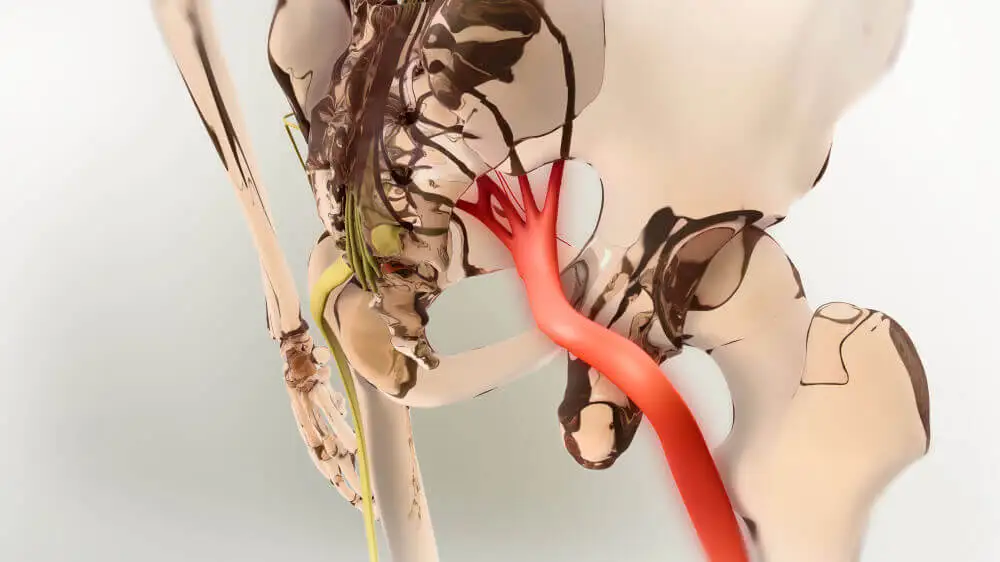Medication for Sciatic Nerve Pain

There are many types of medication for sciatic nerve pain. These range from commonly used analgesics and anti-inflammatory drugs to opioids and corticosteroid injections. Of course, these should always be prescribed by a physician.
In addition, there are other measures and approaches that complement the drugs, such as physiotherapy, local compresses and exercises. All can be applied to help alleviate the well-known and unwanted sciatica.
Causes and symptoms of sciatic nerve pain
“Sciatica” is the pain that occurs when the nerve of the same name becomes inflamed, which, in turn, is usually the result of pinching or compression of the lumbosacral nerve roots.
Possible causes include the following:
- Herniated disc
- Bone spur
- Nerve or sheath tumors
- Maintaining an incorrect posture for a long time, when sitting, for example
Some risk factors may predispose or trigger sciatic nerve pain. For example, jobs that put a lot of pressure on the back (carrying heavy loads) or that force us to remain seated for a prolonged period of time (drivers, seamstresses, tailors, office personnel).
On the other hand, a sedentary lifestyle, obesity and age cause changes in the spine. In particular, excess weight can increase back strain. Likewise, diabetes is among the risk factors, since this disease increases the possibilities of nerve damage (painful diabetic neuropathy).
As for the symptoms of sciatica, the pain radiates along the nerve, being felt at the end of the spine (lumbar area), in the buttocks or in the back of the thigh. It usually affects only one side of the body.
It may be experienced as a continuous stabbing or prickling sensation. In addition, it’s accompanied by a feeling of warmth, burning or tingling, as well as difficulty moving the leg, walking or keeping the back straight.
Read more here: Natural Home Remedies to Treat Sciatica
The most commonly used medication for sciatic nerve pain
Painkillers and anti-inflammatory drugs are the first medication for sciatic nerve pain. Then, if it doesn’t subside, more powerful ones may be recommended.

1. Analgesics
Analgesics, such as paracetamol, are among the most commonly used painkillers for this type of ailment. According to studies, one third of patients show improvement in symptoms after 2 weeks. And 75% of cases after 3 months.
It should be noted that excessive consumption of this drug can cause side effects. The most feared is drug-induced hepatitis.
2. Nonsteroidal anti-inflammatory drugs (NSAIDs)
Some of the medication for sciatic nerve pain, such as ibuprofen and naproxen, have an anti-inflammatory effect. In addition, diclofenac is worth mentioning.
Thus, non-steroidal anti-inflammatory drugs (NSAIDs) are substances with antipyretic, anti-inflammatory and analgesic activity. This is due to their ability to inhibit enzymes involved in the synthesis of prostaglandins.
According to research, the effects associated with the use of NSAIDs include possible gastrointestinal complications, including dyspepsia and gastritis.
3. Muscle relaxants
There are several types of muscle relaxants; some are spasmolytics and others are neuromuscular blockers. Among the most commonly used for the treatment of sciatica are the following:
- Carisoprodol
- Methocarbamol
- Tizanidine
- Cyclobenzaprine
- Orphenadrine
Their mechanism of action is useful when there are muscle contractures associated with sciatica. They aren’t effective for all patients and are never prescribed alone, but are combined with analgesics.
4. Corticosteroids
When the pain in the sciatic nerve is very intense and disabling, to the point that the person can’t walk or stand, corticosteroid injections may be considered.
However, these are sensitive medications. They should only be administered by a health professional.
When doses are high, or treatment is prolonged, they produce adverse effects, such as:
- Stomach discomfort
- Fluid retention
- Increase in blood pressure
- Mood changes
- Memory loss
- Alteration of behavior
5. Opioids
Opioids constitute a broad group of analgesics. When distributed in the blood and interacting with receptors, signals are released that decrease the perception of pain.
There are some derived from poppy and others are synthetic. They can be injected or administered orally; there are even patches.
Among the medications for sciatic nerve pain are opioids such as the following:
- Codeine
- Tramadol
- Fentanyl
As for the risks associated with their use, we can mention drowsiness, disorientation, decreased heart and respiratory rate. They can also produce addiction.
6. Anticonvulsants
Anticolvusives (such as gabapentin and pregabalin) are also used to control pain. They are thought to interfere with the transmission of signals sent by damaged nerves.
However, they can produce side effects, such as nausea, vomiting, drowsiness, headaches, dizziness, blurred vision, lack of coordination and even liver damage.
7. Antidepressants and other psychotropic drugs
Although their uses are oriented to other purposes, antidepressants (such as nortriptyline) and various psychotropics (benzodiazepines), act on the nervous system, producing tranquilizing effects and relieving muscle spasms.
Another great article: Foolproof Recipe: Garlic Milk to Calm Sciatica
Other treatments and measures for sciatic nerve pain
Apart from medications for sciatic nerve pain, there are other measures that can be applied. Always with the authorization of the treating professional.
Physiotherapy is recommended to reduce pain and help restore mobility, as well as to prevent recurrence. Sessions can be carried out in conjunction with the following home techniques:
- Placing warm compresses on the area.
- Massaging the painful area.
- Doing stretching exercises.
- Take natural remedies, such as relaxing herbal teas.
Medical attention should be sought immediately when several of the following symptoms are experienced:
- Decreased sensitivity
- Weakness or loss of strength
- Urinary incontinence
- Fever without apparent cause
.The prognosis is usually positive; most people make a full recovery.
All cited sources were thoroughly reviewed by our team to ensure their quality, reliability, currency, and validity. The bibliography of this article was considered reliable and of academic or scientific accuracy.
- Ansari, R., Dadbakhsh, A., Hasani, F., Hosseinzadeh, F., Abolhassanzadeh, Z., Zarshenas, M. (2021) Traditional Aspects of Sciatic Pain Management and Allied Therapies from Persian Medical Reports. Current Drug Discovery Technologies, 18(2), 194-206. https://pubmed.ncbi.nlm.nih.gov/32178615/
- Botargues, M., Enz, P., Muso, G. (2019) Tratamiento con corticoides. Evidencia, Actualizacion en la Práctica Ambulatoria, 14(1). https://evidencia.org/index.php/Evidencia/article/view/6071
- Chemeisani, A., Hamade, A., AlRaouf, A., Tarhini, H., Hamze, N., Msheik, A. (2023) The Benefit of Early Epidural Corticosteroid Injections for Acute Sciatica-Associated Lower Back Pain: A Four-Year Case Series in Lebanon. Cureus, 15(2), 34847. https://www.ncbi.nlm.nih.gov/pmc/articles/PMC10009298/
- Davis, D., Maini, K., Taqi, M., Vasudevan, A. (2024). Sciatica. StatPearls. https://www.ncbi.nlm.nih.gov/books/NBK507908/
- Giménez, C. M., Fermisson, P., Díaz, C. J., Carbonell, S. R., López, B. E., & Ruíz, G. V. (2022) A systematic review and meta-analysis of the effectiveness and adverse events of gabapentin and pregabalin for sciatica pain. Atención Primaria, 54(1), 102144. https://www.ncbi.nlm.nih.gov/pmc/articles/PMC8515246/
- Harvard Heath Publishing. (21 de abril de 2020). Sciatica home remedies and self-care. https://www.health.harvard.edu/pain/sciatica-home-remedies-and-self-care
- Hirase, T., Hirase, J., Ling, J., Kuo, P ., Hernandez,G., Giwa, K., Marco, R. (2021) Duloxetine for the Treatment of Chronic Low Back Pain: A Systematic Review of Randomized Placebo-Controlled Trials. Cureus, 5, 15169. https://www.ncbi.nlm.nih.gov/pmc/articles/PMC8140818/
- Lanas, A., Perez, B., Alonso, J., Hernández, C. B., Barón, E. G., Perez, A. Á., Calvet, X., García, J. F., Gobbo, M., & Gonzalez, J. R. (2014). Recomendaciones para una prescripción segura de antiinflamatorios no esteroideos: documento de consenso elaborado por expertos nominados por 3 sociedades científicas (SER-SEC-AEG). Reumatología Clínica, 10(2), 68-84. https://www.reumatologiaclinica.org/es-recomendaciones-una-prescripcion-segura-antiinflamatorios-articulo-S1699258X13002131.
- Oliveira, M., Ferreira, M., Hancock M., Oliveira, V., McLachlan A., Koes B., Ferreira P., Cohen S., Pinto R. (2020) Epidural corticosteroid injections for lumbosacral radicular pain. Cochrane Database of Systematic Reviews, 4. https://www.cochrane.org/es/CD013577/BACK_inyecciones-de-corticosteroides-para-el-tratamiento-de-la-ciatica
- Rasmussen‐Barr, E., Held, U., Grooten, W., Roelofs, P., Koes, B., Tulder, M., Wertli, M., Cochrane Back and Neck Group. (2016) Non‐steroidal anti‐inflammatory drugs for sciatica. Cochrane Database of Systematic Reviews, 10(10). https://www.ncbi.nlm.nih.gov/pmc/articles/PMC6461200/
- Santos, C., Donosob, R., Ganga, M., Eugenin, O., Lira, F., Santelicesc, J. (2020) Dolor lumbar: revisión y evidencia de tratamiento. Lumbalgia: revisión y evidencia del tratamiento. Revista Médica los Condes, 31(5-6), 387-395. https://www.sciencedirect.com/science/article/pii/S0716864020300717
- Saragiotto, B; Machado, G., Ferreira, M., Pinheiro, M., Abdel, C., Maher. (2016). Paracetamol para el dolor lumbar. Cochrane Database of Systematic Reviews, 6. https://www.cochranelibrary.com/es/cdsr/doi/10.1002/14651858.CD012230/full/es
- See, S., Ginzburg, R. (2008). Choosing a Skeletal Muscle Relaxant. American Family Physician, 78(3), 365-370. https://www.aafp.org/pubs/afp/issues/2008/0801/p365.html
- Serinken, M., Eken, C., Gungor, F., Emet, M., Al, B. (2016) Coparison of Intravenous Morphine Versus Paracetamol in Sciatica: A Randomized Placebo Controlled Trial. Academy Emergency Medicine, 23(60), 674-678. https://onlinelibrary.wiley.com/doi/full/10.1111/acem.12956
- Solan, M. (1 octubre de 2022). Certain medications are better than others for managing spine pain. Harvard Heath Publishing. https://www.health.harvard.edu/pain/certain-medications-are-better-than-others-for-managing-spine-pain
- Urquhart, D. M., Wluka, A. E., van Tulder, M., Heritier, S., Forbes, A., Fong, C., Wang, Y., Sim, M. R., Gibson, S. J., Arnold, C., & Cicuttini, F. M. (2018). Efficacy of Low-Dose Amitriptyline for Chronic Low Back Pain: A Randomized Clinical Trial. JAMA Internal Medicine, 178(11), 1474–1481. https://www.ncbi.nlm.nih.gov/pmc/articles/PMC6248203/
- Zambelli, R., Verwoerd, A., Koes, B. (2017). Which pain medications are effective for sciatica (radicular leg pain)?. The BMJ, 359, 4248. https://www.bmj.com/content/359/bmj.j4248.full
This text is provided for informational purposes only and does not replace consultation with a professional. If in doubt, consult your specialist.








